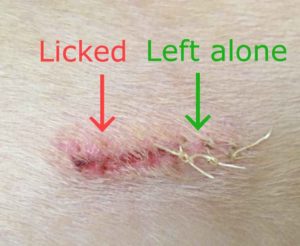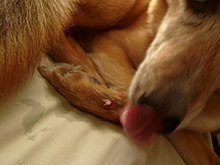
Humans too have a reflex to lick or suck on any cuts. There is even a compound in saliva that can act as a painkiller.

Its because kissing your dog.
Is a dog licking a wound bad. While wound licking is often completely condemned by vets and at the same time almost ritualized by many natural healers there is no simple answer to the question Is wound licking in dogs good or bad Why Dogs Lick Their Wounds. It is not only do dogs have a natural instinct to immediately lick any wound inflicted on them. Humans too have a reflex to lick or suck on any cuts.
But when dogs and cats are truly injured allowing them to lick their wounds can do more harm than good. Like most animal activities wound licking has its roots in behavior that would be beneficial under different circumstances. When a wild animal licks its wounds it is making the best of a bad situation.
With no access to veterinary care. Dog saliva does have the ability to help with simple wound healing. First the act of removing dirt and debris from the wound through licking may help.
Additionally saliva contains proteins that may help fight bacterial infections and promote healing over of the skin. There is even a compound in saliva that can act as a painkiller. Often dogs will lick their owners wounds just as they will lick their own.
Licking their own wounds not only helps them heal but makes them feel better. They lick your wounds to help you for the same reasons. That being said many people will purposely let a dog lick their wounds.
While people have been doing this for years and it IS true that a dogs saliva has some antibacterial properties you still shouldnt allow a dog to lick your wounds. The reason for this is that the amount of bad. Do not let your dog clean your injuries.
Although your dog means well when it tries to lick your wounds canine saliva can cause infections in humans. As dog bites carry risk of infection so does licking. It is rare for dog saliva to cause serious injury but it has in more than one case.
There has been proof many times that a dog licking a wound helps it heal. Just because you dont believe it you dont need to call people names. People didnt believe in many alternate ways of healing that they are more finding out actually work.
If people were just getting lucky they didnt get this there would be millions of cases world wide. Its not a matter of luck. Its because kissing your dog.
It will completely prevent them from licking their wound as their head is separated from the rest of their body. It may be annoying both for you to look at as well as for your dog but it can lead to a more speedy recovery. Bandaging your dogs wound can lead to it not thinking about licking the wound since it cant see it.
Even if it does try to pry off the bandage spraying bitters on the bandage can be an easy fix. No Im talking today about dog licking that is taken to self-harm levels where as a result the dog develops sores called lick granulomas. Maybe youve seen this.
A raised red sore on a front leg that your dog licks at obsessively. Or perhaps you never seen your dog lick but the sore is there all the same. Chances are you told your dog to stop so they learned to become secretive.
Unfortunately licking can reopen the wound and lead to infection. A cone or collar is the traditional way to keep a dog from licking a wound. You can also try covering the wound with a sleeve or strong bandage.
In combination with these techniques engage your dogs attention to keep its mind off the wound. But if the thought of your dog licking you on the mouth sends you running for the antibacterial soap there exists enough of a risk to justify your aversion. Ultimately allowing your dog to lick your face comes down to the state of your health and your level of risk tolerance.
Either way there are plenty of other ways to share affection with your dog so dont feel bad if licking isnt one. Why do dogs lick their wounds. For dogs licking wounds is like you rubbing your head if you hit it.
The nerves used to transmit the rubbing sensation block the feeling of pain or soreness. And canine saliva does have some mild antibacterial effect. For wild or feral dogs licking is probably beneficial in cleaning a wound.
But wild animals are busy staying safe and finding food whereas a well. Many theories are surrounding this behavior and many reasons why your dog may be licking his or her wounds. It has been proposed that licking helps clean the wound but perhaps licking serves as a behavior to soothe the nerves as the wound heals or promotes healing by stimulating enzymes in the saliva.
Its no secret that dogs lick their wounds. Excessive licking can lead to the formation of hot spots or red raw spots where the skin and fur is now missing. Your dog may grunt uncomfortably if the area is painful or very bothersome or you may see your dog start to lick the area almost constantly even if it appears nothing is wrong.
Were taught at an early age that getting bitten by a dog could be bad news especially when it comes to rabies but dog licks didnt come with the same warning. So consider this your warning. Wound licking is an instinct of many mammals and doggies are not an exception.
However despite the healing properties of saliva you must not encourage the licking behavior. Try stopping it because it can lead to various complications that may be harmful to both your dogs. Therefore your wound will be well protected after a dog licks your wound.
Boost immune system A research from University of Arizona found that the exposure of dog in people between 50 to 60 years old significantly improve their immune system.